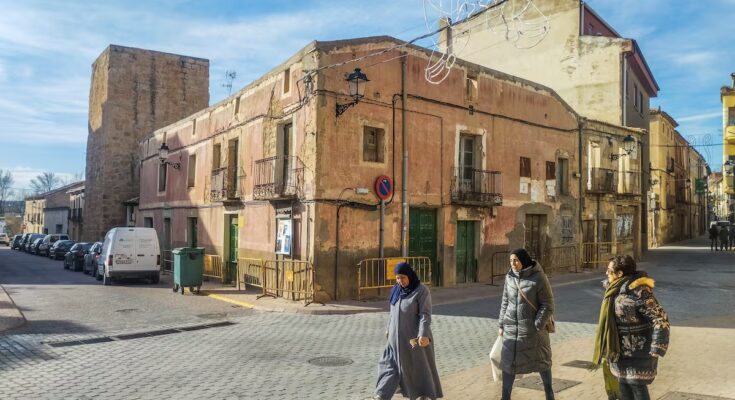The rise of the far right in Spain with its strong xenophobic message has a marked impact in some rural areas of the interior, where the presence of foreigners is however scarce or practically non-existent. Who will clean the houses if they are expelled? The president of the Community of Madrid, Isabel Ayuso, responded to Vox with an interested question. Others are not wondering about domestic dirt, but about the employment and development possibilities of a population that already represents a fifth of the residents in Spain. But while in some neighborhoods of big cities foreigners suffer neighborhood rejection as they desperately search for work, in rural Spain job offers are growing that no one satisfies: there is a shortage of electricians, plumbers, bricklayers, carpenters and obviously staff who take care of the elderly in an aging Europe. Why are there no migrants in smaller cities?
The organizations that collaborate with them to offer them training and career guidance know the resistance they encounter when moving to small cities and have their reasons: “In some cities there are no schools, social services they need or internet”, cites as an example Mónica López, director of CEAR, the Spanish Commission for Refugee Assistance. There are other problems that are even more difficult to solve, such as public transport, which is in short supply in those locations to travel to the regional capitals or move between cities. “Many don’t have a driving license or don’t have one approved or don’t have a car,” he adds. The housing problem must also be taken into account. Paradoxically in small towns there are many unused houses, but few want to rent, why spend money on fixing the roof or putting in new heating if the rental period is usually short? “This is what many mayors of rural areas tell me,” says Antón Costas, president of the Economic and Social Council (CES), who last week presented in Madrid a large study on the migration phenomenon commissioned by the Ministry of Migration.
“Migrants do not behave like pioneer explorers entering unknown territories, rather they act on their own call effect and they go where their peers are already settled”, explains Costas. But he observes that in rural areas we are starting to see incipient colonies of concentration which at the beginning, he says, act slowly and accelerate over time, “like seeds that germinate underground until they emerge”. The president of the CES trusts in dual professional training, which does its internships in companies, the great engine of employment and development, where the highest percentage of students come from immigration. “It is a path that is being strengthened with the new regulations on immigration,” he says.
Him call factor which still concentrates foreigners in the big cities and, at most, in the regional capitals, was a classic in the history of exoduses: some go where others have already arrived and inform them about job opportunities by offering them a network of help, understanding and culture. “If they come from big cities, they don’t get used to the countryside, but even young people from villages are stunned by the idea of the big European capitals, Madrid, Paris, Barcelona, it is difficult to convince them otherwise”, explains Mónica López.
“Migrants only highlight the usual problems of the Spanish labor market. Caregiving jobs in the rural world are very sacrificial, painful, precarious, poorly paid”, says the head of Migration at the Workers’ Commissions, José Antonio Moreno, who also mentions the isolation of these workers. «It is a job that could never be included in the catalog of professions that are difficult to fill because it cannot be hired at source, families want to know the person who will take care of their elderly person», he explains. Many of those that exist remain informal. This sector, with strong demand in the cities, “needs a good development of employee services in Spain, which are a good source of employment, but are in absolute deficit”, criticizes the trade unionist.
The work profile of each migrant is obviously different. ACCEM, the large social inclusion organization for migrants and refugees, has accompanied cases like that of Nataliia Taranes, a Ukrainian woman who settled with her daughter in Valencia de San Juan (León), where they lasted only a year before moving to the provincial capital. Coming from Odessa, near the Black Sea, they did not find enough work: “It was only in the summer, when there is a lot of tourism, it is a small town, with about 5 thousand inhabitants. They gave us a lot of help, but what we want is to work”, says the woman on the phone. She has settled in a nursing home and her daughter works in a hotel. “She is happy in Leon, with her colleagues, and I go to concerts, to the cinema, the people of the city were good, but my life (in Ukraine) was in the city,” he says.
Selecting the profiles of each person to direct them to the best destination is not an easy task, despite the agreements with companies stipulated by civil organizations present, among others, in each of the Spanish provinces. “It wouldn’t be bad to have a centralized tool that maps all job offers, as there are in other countries and has been organized occasionally in Spain,” acknowledges Mónica López. Because normally it is the companies, he says, who indicate the positions to be filled.
The TENT platform, born in the United States and arrived in Spain three years ago, is very involved in this mapping. Today there are more than 50 large companies from all sectors that are encouraged to hire foreign talent. They are a bridge between NGOs and large companies. Its director, Amaia Elizalde, also highlights the structural barriers they face, such as language, transportation or the recognition of qualifications. But the fact that they are large companies, he says, limits the work experience in smaller towns, where sometimes the idea of lower well-being and economy that migrants have is not entirely true.
Peruvian Gisela Rojas has been in Spain for more than 18 years and has always been in the city. From Marbella he soon moved to Coria (Cáceres) where he took care of a girl with bronchial problems. There she married a man from another even smaller town, Barrado, also in Cáceres, which has less than 400 inhabitants and not only does she not lack work, but she has to refuse it because she can’t cope, in caring for the elderly or in house cleaning. “I came to Spain looking for quality of life and because there is none in the villages. Some of my compatriots believe that these small villages will become like those of Peru, that you will have to ride a donkey. Instead you don’t need a car to go to work, there is everything and you pay no less than in the city. I found human warmth and a lot of acceptance, peace and tranquility. Some friends I brought miss supermarkets, McDonald’s or Kentucky, junk food (junk food), wow, the shops. Not me. I got my driving license in Spain and I go to Plasencia if I need something. They have never tried the cities, but there are many opportunities and they are cheaper and it is the healthiest way to raise children,” he says. Also enhance the bonds that are generated, of friendship and work. “In these cities word of mouth continues to work, you don’t need a pay slip to rent, just the word is enough. They haven’t tried it, I recommend it with my eyes closed.”



